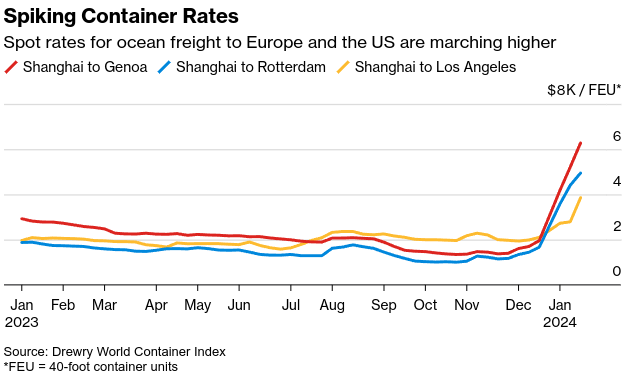
ImageNicholas Cappello
Data indicates that disruptions in Red Sea shipping are causing significant supply-chain challenges in Europe’s top three economies – the United Kingdom, Germany, and France. S&P Global’s Composite Purchasing Managers’ Index for Britain has reported “widespread reports of higher freight costs,” contributing to the surge in manufacturing inflation, reaching the highest level since March. Additionally, supplier delivery times have extended for the first time in a year.
The impact of geopolitical unrest in the Middle East is reflected differently in each country. Germany, experiencing private sector contraction for the seventh consecutive month, has seen the rate of decline in factory input costs at its weakest in nine months. Meanwhile, France witnessed a significant deterioration in delivery times, marking the poorest reading in a year.
Red Sea Shipping Turmoil: A Global Economic Shock
Europe’s industrial sector, already grappling with sluggish consumer demand, is now dealing with the aftermath of a supply shock that originated in mid-December. This disruption began when the world’s largest cargo ships started avoiding the southern tip of Africa to evade rocket attacks by Houthi militants attempting to disrupt trade through the Red Sea.
These longer shipping routes are disrupting delivery schedules, causing disruptions in inventory flows, and quadrupling spot rates for shipping goods from Asia to northern Europe.

Cyrus de la Rubia, Chief Economist at Hamburg Commercial Bank, emphasized, “The persistent attacks by Houthi rebels on commercial vessels navigating the Red Sea are exerting discernible impacts on supply chains.” The latest PMI reports for the euro area confirm that private-sector activity contracted for the eighth consecutive month in January, with both Germany and France facing a challenging start to the year.
While the UK experiences budding supply snarls, it remains a blemish on an otherwise positive January report, reinforcing optimism about the economy avoiding a recession. However, these disruptions, coupled with persistent inflation in service industries, could prompt the Bank of England to reconsider interest rate cuts, as noted by Chris Williamson, Chief Business Economist at S&P Global Market Intelligence.
“Inflation is therefore indicated to remain stubbornly higher in the 3-4% range in the near future,” Williamson remarked, highlighting the potential challenges in the economic landscape due to the ongoing disruptions in Red Sea shipping.
Source: bloomberg + Drewry

